I tried AncestryDNA’s genetic health screening feature—here’s what happened
What does your DNA say about your health?
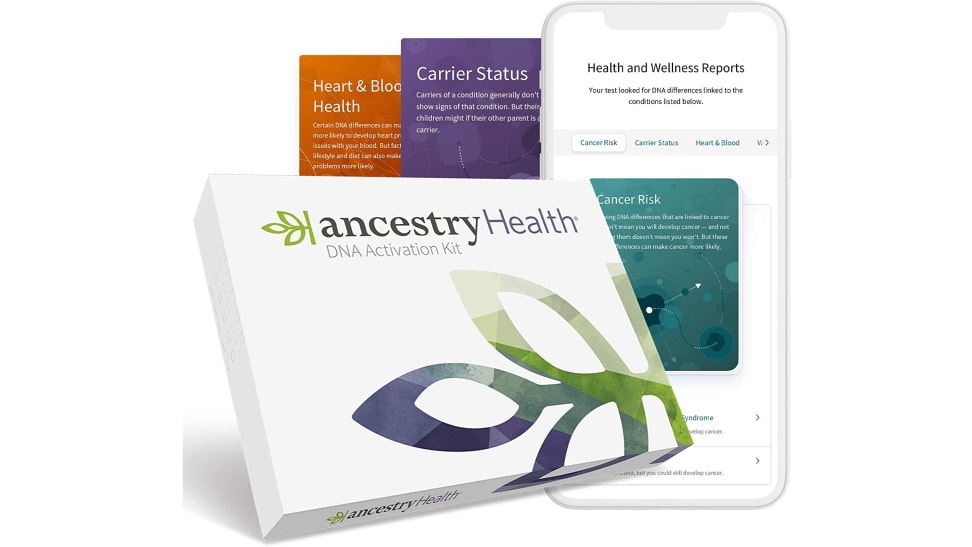 Credit:
Ancestry
Credit:
Ancestry
Products are chosen independently by our editors. Purchases made through our links may earn us a commission.
Editor's Note: Ancestry announced on January 15, 2021, that it would be discontinuing its AncestryHealth product. If you are looking for a health and ancestry kit, we recommend 23andMe.
Not to toot my own horn, but I consider myself a healthy person. I work out at least three times a week, I eat a mostly balanced vegetarian diet, and I try to do things regularly that will bring me joy. Although on the surface it might look like I’ll live to be 100 (I’m in my mid-20s, mind you), there are some factors beyond my habits that can affect my health.
I’m talking about genetic predisposition, or the likelihood of getting a disease because it “runs in the family,” thanks to our DNA. While rare, 5 to 10 percent of all cancers occur from variants in genes, according to the National Cancer Institute, and environmental factors are more impactful on chronic diseases than genes, says a Stanford Medical report, looking at differences in genes for any potential disease can be a "better safe than sorry" approach.
While I have a general idea of what I may be at risk for from my mother’s side (her sister had breast cancer and thankfully is in remission), my dad was adopted, which creates a huge gap in genetic awareness of any medical problems that could be passed to me.
That’s why I was excited when Ancestry released its AncestryHealth test last fall. I’d already found tremendous value in the service’s ever-updating AncestryDNA that provides me a complete picture of my heritage, and its fascinating Traits feature that, for example, explained how my DNA predisposes me toward a sensitivity to sour foods.
To see if the new service was worth the money, I added AncestryHealth to my AncestryDNA membership, which allowed the company to run new tests on my DNA.
How does the AncestryHealth test work?
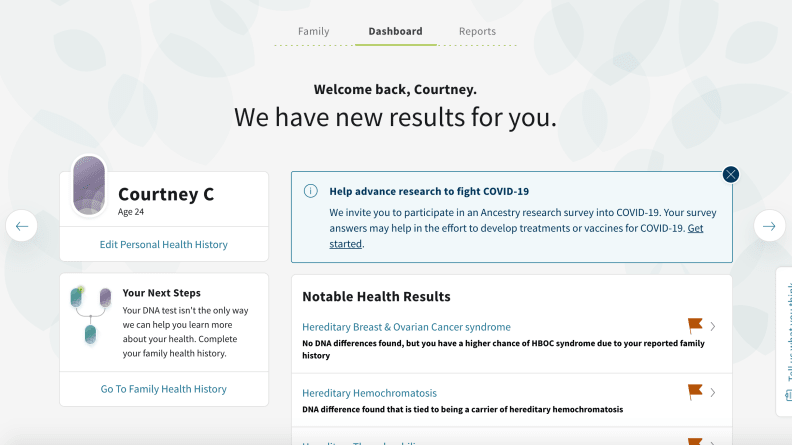
This is the page you'll see when you enter AncestryHealth.
First off, a few big disclaimers: AncestryHealth is currently unavailable in New York, New Jersey, and Rhode Island, as these states have laws that require any DNA-testing laboratory obtain a state-issued permit to perform health-related genetic testing. Further, the AncestryHealth tests have not been reviewed or approved by the Food and Drug Administration as a health diagnostic tool. They are "physician-ordered" via testing partner PWNHealth, a company composed of board-certified physicians and genetic counselors to help with these kind of direct-to-consumer tests—something of a legal loophole for Ancestry to avoid the lengthy FDA approval process—but this also means that the results come with free genetic counseling, if desired, via the test lab company.
With its "consumer-centric" test, AncestryHealth test is designed to bring your attention to the possibility of an increased risk of certain diseases and provide detailed reports you can bring to your doctor for further diagnostic tests and treatment or prevention discussions. (Though, given that AncestryHealth looks at some of the same DNA markers of the FDA-approved tests, the results will likely be at least cursorily similar to what you'd get from the tests that have cleared the FDA.) "[These genetic tests] are certainly based on science and they're based on an increasing amount of science and data available, but they do still have their limitations," says Gillian Hooker, President of the National Society of Genetic Counselors. "The science is still evolving around them so there's certainly things that need to be taken with a grain of salt."
I had taken an AncestryDNA test about three years prior, so the company was able to use my previous sample—a relief, as I did not want to spit in a tube again. But if you haven’t taken the test yet, you’ll have to spit into a small tube, shake it up, and send it off in the mail. Before Ancestry would give me access to my health results, I had to fill out a short questionnaire to determine my eligibility (principally, if I’m located in a state that allows the test) and provide the physician reviewing my test request with enough medical info to "approve" it. The questions were very straightforward and similar to what you’d expect from an annual checkup, and this is where I disclosed any health issues I knew of from me or my family—namely, my family’s history with breast cancer.
Because AncestryDNA had my DNA on file, I assumed it would be a quick turnaround for my AncestryHealth results. Unfortunately, this was not the case—it took about eight weeks, or about the same length of time I waited for my ethnicity results. From my understanding, it takes time to process eligibility as well as re-screen my DNA for health indicators with the third-party lab.
What did I learn from my AncestryHealth results?
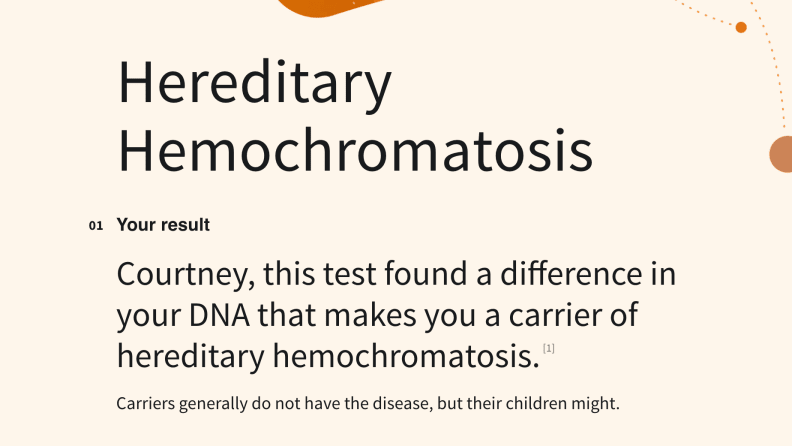
The page of my genetic results for hereditary hemochromatosis.
AncestryHealth uses your DNA to look at variants in certain genes that the current research has linked to particular health conditions. Currently, these tests include certain cancer risks, such as hereditary breast and ovarian cancer syndrome and Lynch syndrome; carrier status for cystic fibrosis, sickle cell anemia, and Tay-Sachs disease; and heart and blood health conditions cardiomyopathy, familial hypercholesterolemia, hereditary hemochromatosis, and hereditary thrombophilia. For example, it looks for variants in BRCA1 and BRCA2, as these are linked to hereditary breast and ovarian cancer syndrome. The Ancestry site lists all of the gene variants tested, but it all appeared to be a bunch of gibberish to me (for example, NM_007294.3(BRCA1):c.5277+1delG).
Ancestry also makes it very clear that these results are not confirmation that you have, are at risk, or are a carrier for a certain disease—they are only a suggestion that you might be. Similarly, if no DNA aberrations are found, you may still develop a health issue, as genetics are just one small role in health. If you’re concerned with any results you get, again, you can seek counseling via AncestryHealth or contact your healthcare provider for a discussion of next steps, if any.
Which brings me to my results. To be honest, I found them pretty vague—but I think this feeling came from the overwhelming emphasis on how inconclusive they might be, which made them feel less “real” to me. Of all the health concerns AncestryHealth screens for, I only tested “positive” for a “higher chance” of developing breast cancer—which was based on my reported family history, not my DNA—and being a carrier for blood conditions hereditary hemochromatosis and hereditary thrombophilia, both of which don’t affect my health, but could impact my potential future children.
But if someone was to receive any concerning results, Gillian says there are options to work through the emotions that comes with any alarming genetic information. "The number one thing I say is take a breath and take a moment to understand what it means and find the right resources to help you understand," she says. "Whether its the resources that the website has or finding a genetic counselor to sit down with you, but make sure you know what it means before taking any sort of medical decision."
AncestryHealth also breaks down some wellness proclivities based on your genes, such as whether you’re likely to experience alcohol flush, the type of muscle fibers you may have and their impact on your athleticism, and whether you’re predisposed to vitamin deficiencies. Again, these results are very much “you could, but you also could not,” as DNA is just one of the many factors that impact health. From this I learned that I am potentially deficient in most vitamins (a reminder to eat a balanced diet) and that I’m more likely to have the same muscle composition as an elite sprinter (which really makes me feel like I should be a faster runner).
I found these wellness results more light and entertaining. Each came with a report that explained what gene variants could affect the area of wellness as well as changes I could make in my daily life to improve these areas. For muscle composition, it explained that my ACTN3 gene makes a protein that increases the strength of fast-twitch muscle fibers and can increase my odds of being an elite, speed-oriented athlete. It also notes that I don’t have to be an elite athlete to take in the benefits of physical activity, which … right.
How can you use your AncestryHealth results?
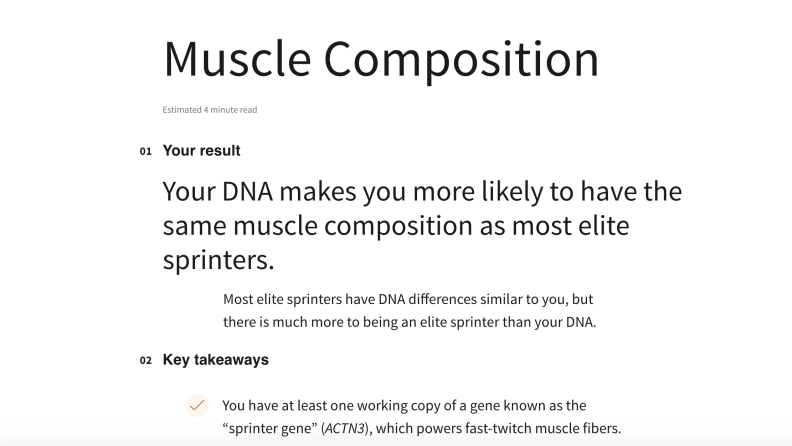
According to my AncestryHealth results, I should be an elite sprinter.
It bears repeating again: You should talk to your doctor if you find anything concerning in your AncestryHealth results, and Ancestry provides a printable report to bring to your appointment. But Ancestry also provides you with some additional resources through its partnership with PMWHealth.
Certified genetic counselors are available through videos, direct messaging, and even one-on-one counseling, if it’s appropriate. These resources breakdown any notable findings and explain the more unknown health concerns—I had no idea what hemochromatosis and thrombophilia were before this—as well as guide you for next steps, like doctor-ordered genetic and other diagnostic screenings.
I watched several of the videos, which I found to be a little stiff and corporate, but engaging enough to complete the full few-minute segments. For example, when learning that hereditary hemochromatosis is an iron-overload disorder, and because I’m a carrier of a gene that contributes to it, there’s a possibility of passing it onto my children if my partner is also a carrier (that’s just Biology 101). I also learned that DNA differences linked to this disease are found most often in people of Northern European descent, which merges the ancestry with the health (though it calls into question whether I needed to spend the $50 to learn something that was likely the case based on my ancestry).
Because I’m only a potential carrier for these diseases, I don’t think I’ll bring any concerns to my doctor until I’m planning to have children (which, by my calculations, won’t be for a while). As for the risk of breast cancer which I knew about, I’ve already discussed it with my gynecologist. That said, I found the AncestryHealth video resources interesting and useful (such as what it means to be a carrier).
Like my experience with AncestryDNA, I found that what you get out of your results is what you put into evaluating them. You could brush over your results and think about consulting your doctor, or you can dig into the additional resources on the site to better prepare yourself for when you meet with a healthcare professional.
You can also opt to build a “tree” to track your family’s health history (similar to the Thrulines feature that builds a more traditional family tree using AncestryDNA) to organize any hereditary diseases linked though your family. But that’s only useful if you have relatively complete lineage information on hand—which I do not (adopted dad, remember?).
How much does AncestryHealth cost?
The cost for AncestryHealth is $149, or an additional $49 if you already paid for the AncestryDNA service (which costs $99 on its own). You cannot purchase AncestryHealth a la carte, but I believe the DNA features are more interesting and more accurate than the information given by Health alone, so that’s worth having regardless.
Should I be concerned about the privacy of my health data?
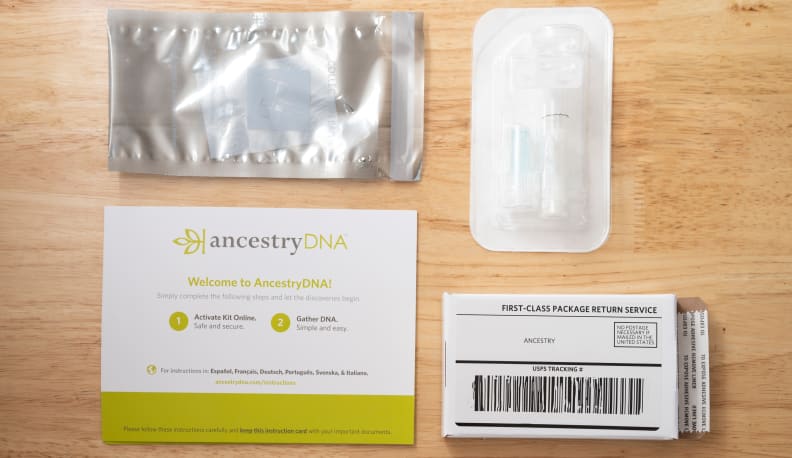
What comes with your AncestryHealth kit—spit tube included.
While we’ve discussed privacy concerns of DNA testing kits previously, you might be worried about anyone—especially potential employers—accessing your health data. To ease these concerns, Ancestry has a robust privacy center and before you hand off your DNA, it walks you through a series of disclaimers for how your data will be used. Sounds a little scary, but these disclaimers are quite clear.
According to Ancestry, all sensitive data is encrypted and users have some control over what happens to their own DNA, although biological samples are stored for future testing (if they weren’t, I couldn’t have added the Health evaluation to my account). You may also opt in to making your DNA available for scientific testing—for example, Ancestry is currently promoting the option to participate in a research survey for COVID-19. All that said, your DNA is up for grabs when it comes to police departments and federal agencies, who use DNA matches for investigating cold cases, though samples can only be obtained with a subpoena or warrant.
Is AncestryHealth worth it?
If you already have AncestryDNA and are willing to spend $50 to get more out of your DNA sample or have any looming health concerns, I think AncestryHealth is an interesting add-on to Ancestry’s great heritage service. However, if getting a genetic screening is your sole goal of the product, paying $150 is a steep ask. If you are concerned about your genetic health already, you’re better off consulting with your own doctor or a genetic counselor first—though AncestryHealth can serve as a wake-up call to making that decision and taking control of your health. "I think [getting an AncestryHealth test] definitely falls into the realm of personal decision and personal value assessment, as in how valuable this kind of information is to you," Hooker says. "I think a lot of the value comes from satisfying curiosity, learning from expanding your understanding of your genetics."
My biggest gripe with AncestryHealth was that it felt more like information for information's sake, especially when it recommends seeking out a health professional—which you could just do in the first place. Personally, I wish there was an “AncestryWellness” service where I could just receive the wellness information, which I found most interesting, instead of the “scary” potential health issues that I would need an expert for.
Which brings me to a final point on the potential scariness factor: If you are the sort of person who worries a lot in general—or worries a lot about your health, specifically—getting such a test could set you up for undue concern. If not, and your curiosity cannot be sated now that you know this information about yourself is available to you (for a price), go for it.


